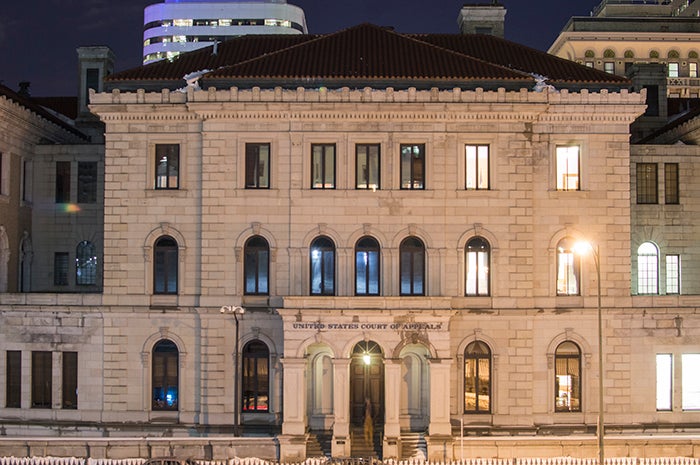Appeals court to reconsider Rowan County prayer case
Published 9:14 am Tuesday, November 1, 2016

- Josh Bergeron / Salisbury Post - The 4th Circuit Court of Appeals.
By Josh Bergeron
josh.bergeron@salisburypost.com
SALISBURY — Appeals court judges aren’t finished with Rowan County’s prayer lawsuit yet.
On Monday, the 4th Circuit Court of Appeals granted a rehearing request from the North Carolina ACLU — representing three Rowan residents in the county’s prayer lawsuit. At issue is whether county commissioners can offer sectarian opening invocations at the start of meetings.
First, in 2015, a federal district court in North Carolina ruled commissioners’ prayer practices were unconstitutional. Then, in September, a three-judge panel in the 4th Circuit Court sided with commissioners by a 2-1 count and overturned the initial ruling. Now, all 15 judges in the 4th Circuit have vacated the court decision in commissioners’ favor and tentatively scheduled a rehearing for Jan. 24 to 26.
The court held a poll of active judges to come to its decision.
“We’re very pleased that the full Fourth Circuit has agreed to review this practice that is clearly out of step with the First Amendment’s protection of religious liberty,” said Chris Brook, legal director of the North Carolina ACLU. “When people attend meetings of their local government, they should not have to worry about being coerced to participate in a sectarian prayer that goes against their beliefs and being discriminated against by local officials when they don’t.”
Reacting to the decision, Commissioners Chairman Greg Edds said only that he was aware the 4th Circuit granted the rehearing request.
Rowan County’s prayer lawsuit represents the first significant case to question public prayer since a 2014 Supreme Court case — Town of Greece v. Galloway. The Greece v. Galloway case has become central in Rowan’s case.
With their decision to grant a rehearing, appeals court judges also moved Rowan’s prayer lawsuit into a relatively small group of cases. Only .3 percent of cases are granted a hearing in front of all 15 judges.
A majority of the 15 judges have been appointed by Democratic presidents — six by President Barack Obama and three by former President Bill Clinton. A Republican appointee, however, was a reason for the ACLU and the three Rowan residents to feel optimistic about a hearing in front of all justices.
In the 4th Circuit’s September dissent, Judge J. Harvie Wilkinson offered a cautionary tale of what might happen if Rowan’s prayer practices were allowed to stand. Wilkinson, appointed by former President Ronald Reagan, has been considered at various points for a U.S. Supreme Court nomination.
“When a seat of government begins to resemble a house of worship, the values of religious observance are put at risk, and the danger of religious division rises accordingly,” Wilkinson wrote in the Rowan County decision. “This, I respectfully suggest, is what is happening here. It cannot be right.”
University of Richmond law professor Carl Tobias said the full court is likely to agree with Wilkinson’s dissent instead of the majority opinion of the three-judge panel. In a previous interview with the Salisbury Post, Tobias said he suspected the court would grant a rehearing.
“I think (Wilkinson’s) treatment of the issues is more persuasive than the majority opinion,” Tobias said.
He also noted Wilkinson’s highly respected stature within the 4th Circuit.
The appointing president, he said, is “too crude an instrument” to be a realistic gauge of the final decision.
“It’s hard to know what the court might do, but I think the sign is the decision to rehear en banc,” Tobias said. “It tells us the court is willing to rehear and maybe more.”
Although the appeals court decision is technically vacated, Tobias said the 15 judges may discuss parts of the majority opinion and dissent before issuing an opinion.
In the district court decision, Judge James A. Beaty wrote that the prayer practices used by Rowan County from 2007 to 2013 — where commissioners offered sectarian, Christian prayers — entangled government with religion and established a pattern of prayers that advanced the Christian faith of elected commissioners at the expense of religions not represented by the board.
In court, Rowan County is being represented by the Texas-based National Center for Life and Liberty, which is not charging the county for its legal services.
Contact reporter Josh Bergeron at 704-797-4246.




